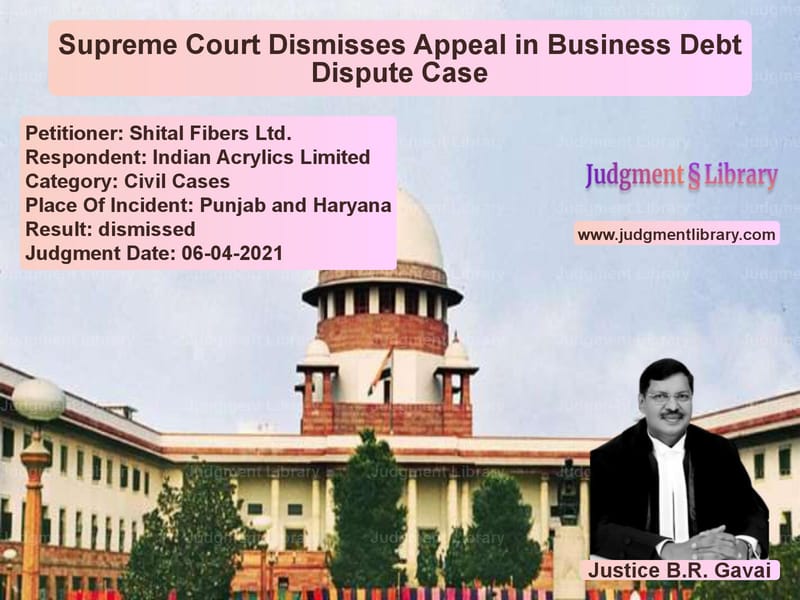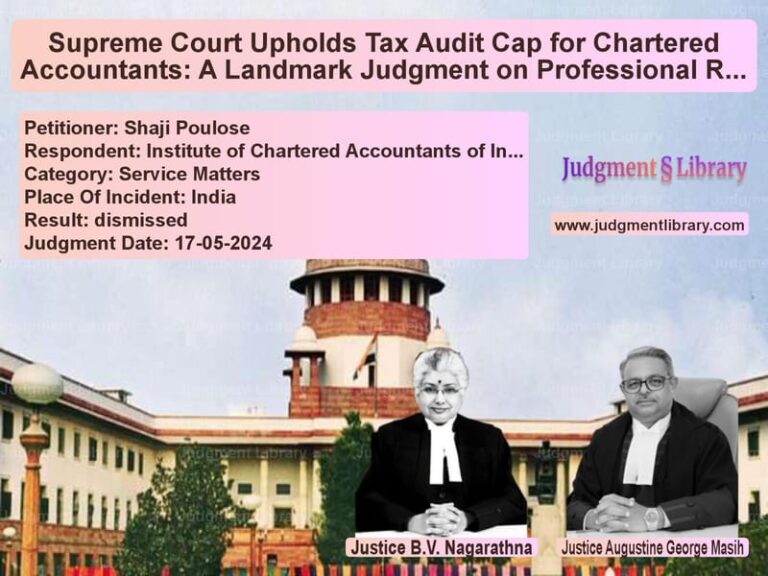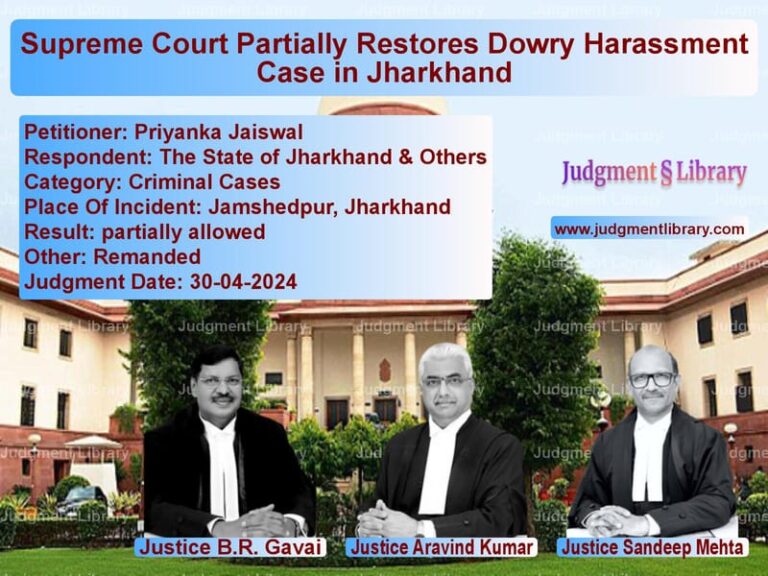Supreme Court Dismisses Appeal in Business Debt Dispute Case
The Supreme Court of India recently delivered a judgment in Shital Fibers Ltd. v. Indian Acrylics Limited, addressing a business debt dispute involving two companies over unpaid invoices and defective goods. The appellant, Shital Fibers Ltd., sought to challenge the High Court’s decision that dismissed their appeal regarding the winding-up petition filed by the respondent, Indian Acrylics Limited. The case centered on the issue of unpaid dues and whether the appellant was liable to pay the outstanding amount despite contesting the quality of the goods supplied.
Background of the Case
The dispute arose from a business transaction between Shital Fibers Ltd. (appellant) and Indian Acrylics Limited (respondent). The respondent, a manufacturer of acrylic yarn, supplied material worth Rs.81,98,014.45 on a credit basis to Shital Fibers Ltd. between 2007 and 2008. However, Shital Fibers Ltd. raised concerns regarding the quality of the material supplied, claiming that much of it was defective. The appellant argued that goods supplied after June 2007 were faulty, leading to product returns worth Rs.6,22,073 and a credit note of Rs.5,00,000 for defective material. Despite the returns and adjustments, the outstanding balance stood at Rs.8,92,723 as of July 28, 2008.
Read also: https://judgmentlibrary.com/supreme-court-rules-on-tenant-rights-in-wakf-property-landmark-judgment/
When the appellant failed to make the full payment despite repeated requests from the respondent, Indian Acrylics Limited issued a statutory notice. When the payment was not made, the respondent filed a company petition in the Punjab and Haryana High Court, seeking the winding-up of Shital Fibers Ltd. due to its failure to pay the admitted debts.
Petitioner’s Arguments (Shital Fibers Ltd.)
- The appellant argued that the respondent had supplied defective goods, leading to losses and a failure to meet market demands. They claimed that the respondent had acknowledged the defects by providing credit and return options, and thus the respondent’s claim was unjustified.
- Shital Fibers Ltd. further contended that despite being an ongoing business with financial viability, the respondent’s demand was unreasonable given the defective quality of the material supplied. They argued that the respondent’s petition to wind up the company should not be entertained.
- The petitioner’s counsel argued that there was no agreement between the parties for the payment of interest on delayed payments, and therefore, the interest claim made by the respondent was invalid.
Respondent’s Arguments (Indian Acrylics Limited)
- The respondent contended that the appellant owed a sum of Rs.35,14,776.30 as per the invoices, which was overdue, and had been repeatedly reminded to make payment. Despite reminders, no satisfactory reply or payment was made.
- Indian Acrylics Limited argued that the appellant’s defense regarding defective goods was an afterthought and was not raised at the time of delivery or during the statutory notice period. The respondent’s conduct, including issuing a credit note, reflected a fair approach towards addressing the appellant’s concerns.
- The respondent also pointed out that the appellant had already paid a substantial amount (Rs.61,83,218) but failed to pay the remaining dues, which led to the filing of the winding-up petition.
Supreme Court’s Analysis and Judgment
The Supreme Court, after carefully considering the arguments of both parties, examined the merits of the petition, focusing on the facts of the case, the conduct of the appellant, and the legal standing of the respondent’s claims. The Court observed the following:
- “The defense raised by the appellant concerning defective goods was not supported by adequate evidence. No documentation was produced to substantiate the claim that the goods were defective beyond the returned material.”
- “While the appellant raised the issue of quality, it was found that the respondent had made efforts to address these concerns by issuing credit notes and accepting returned goods. The appellant’s defense appeared to be a subsequent invention rather than a genuine dispute.”
- “Despite the appellant’s claims regarding defective goods, the respondent’s actions demonstrated an effort to resolve the issue fairly by offering credits and accepting returns, indicating that there was no malicious intent to cheat or defraud the appellant.”
- “The failure to pay the amount of Rs.8,92,723 despite the multiple opportunities given to settle the matter points to a clear case of neglect to pay the debt owed by the appellant.”
Ultimately, the Court found that there was no bona fide dispute regarding the debt owed by Shital Fibers Ltd. The appellant’s attempts to avoid payment, combined with the lack of concrete evidence to support the claims of defective goods, led the Court to dismiss the petition.
Key Legal Principles Reinforced by the Judgment
- Bona Fide Dispute: The ruling reinforces the importance of establishing a bona fide dispute in cases of unpaid debts. If a company fails to substantiate its defense and only raises objections as an afterthought, the petition for winding up may still proceed.
- Winding-Up Petitions: The judgment also emphasizes that winding-up petitions are not to be dismissed solely based on the financial standing or potential for company recovery; the legal validity of the claim must be addressed.
- Documentary Evidence: The decision highlights the importance of documentary evidence in business disputes, especially when claiming defects in goods supplied.
Impact of the Judgment
This judgment sets a precedent in cases where the defense involves disputed debts, especially in commercial transactions. The Court’s emphasis on documentary proof and bona fide disputes is significant for creditors and businesses in similar situations. The judgment clarifies that companies cannot delay payments under the guise of unsubstantiated claims, and winding-up proceedings can be initiated when debts are undisputed.
Conclusion
The judgment in Shital Fibers Ltd. v. Indian Acrylics Ltd. highlights the importance of genuine disputes in business debt cases and reinforces the principle that legal proceedings must proceed when debts are undisputed. The ruling is a crucial step in upholding the integrity of commercial transactions and the efficiency of winding-up proceedings under the Companies Act.
Petitioner Name: Shital Fibers Ltd..Respondent Name: Indian Acrylics Limited.Judgment By: Justice B.R. Gavai.Place Of Incident: Punjab and Haryana.Judgment Date: 06-04-2021.
Don’t miss out on the full details! Download the complete judgment in PDF format below and gain valuable insights instantly!
Download Judgment: shital-fibers-ltd.-vs-indian-acrylics-limi-supreme-court-of-india-judgment-dated-06-04-2021.pdf
Directly Download Judgment: Directly download this Judgment
See all petitions in Contract Disputes
See all petitions in Property Disputes
See all petitions in Debt Recovery
See all petitions in Judgment by B R Gavai
See all petitions in dismissed
See all petitions in supreme court of India judgments April 2021
See all petitions in 2021 judgments
See all posts in Civil Cases Category
See all allowed petitions in Civil Cases Category
See all Dismissed petitions in Civil Cases Category
See all partially allowed petitions in Civil Cases Category







